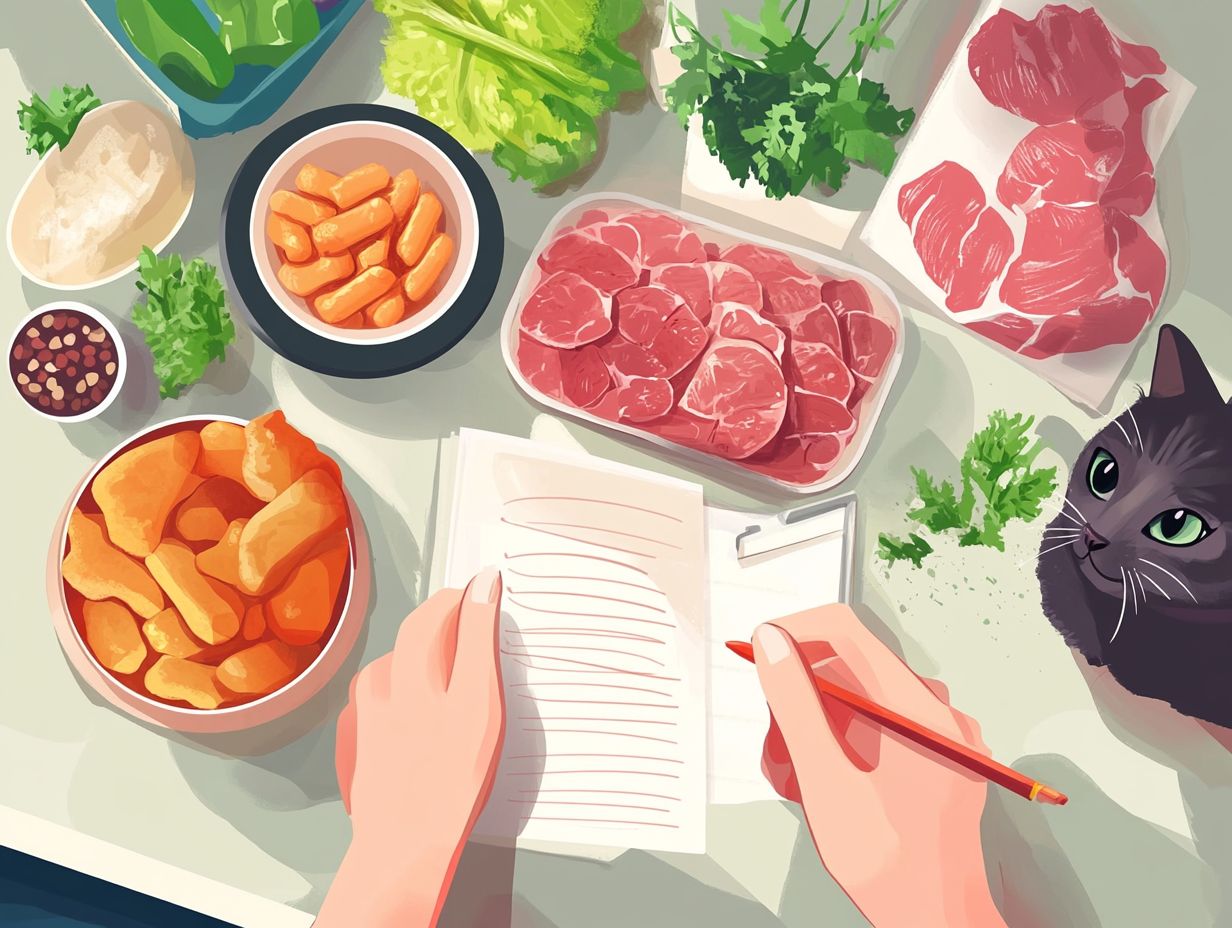Caring for a cat with chronic kidney disease (CKD) can be overwhelming, especially regarding their dietary management. Proper feline nutrition plays a crucial role in managing this condition and can significantly impact your cat’s kidney health and quality of life. Always consult with a veterinarian before making any dietary changes, as individual needs may vary.
This article explores which foods to avoid, including those high in phosphorus, protein, and salt, as well as safe alternatives that promote kidney health. We will discuss supportive treatments such as appetite stimulants and kidney-supportive supplements, emphasizing the importance of discussing these options with a veterinarian to avoid potential harm.
Read on to gain knowledge about CKD prevention and management for your cat’s well-being, including veterinary guidelines and dietary recommendations.
Key Takeaways:
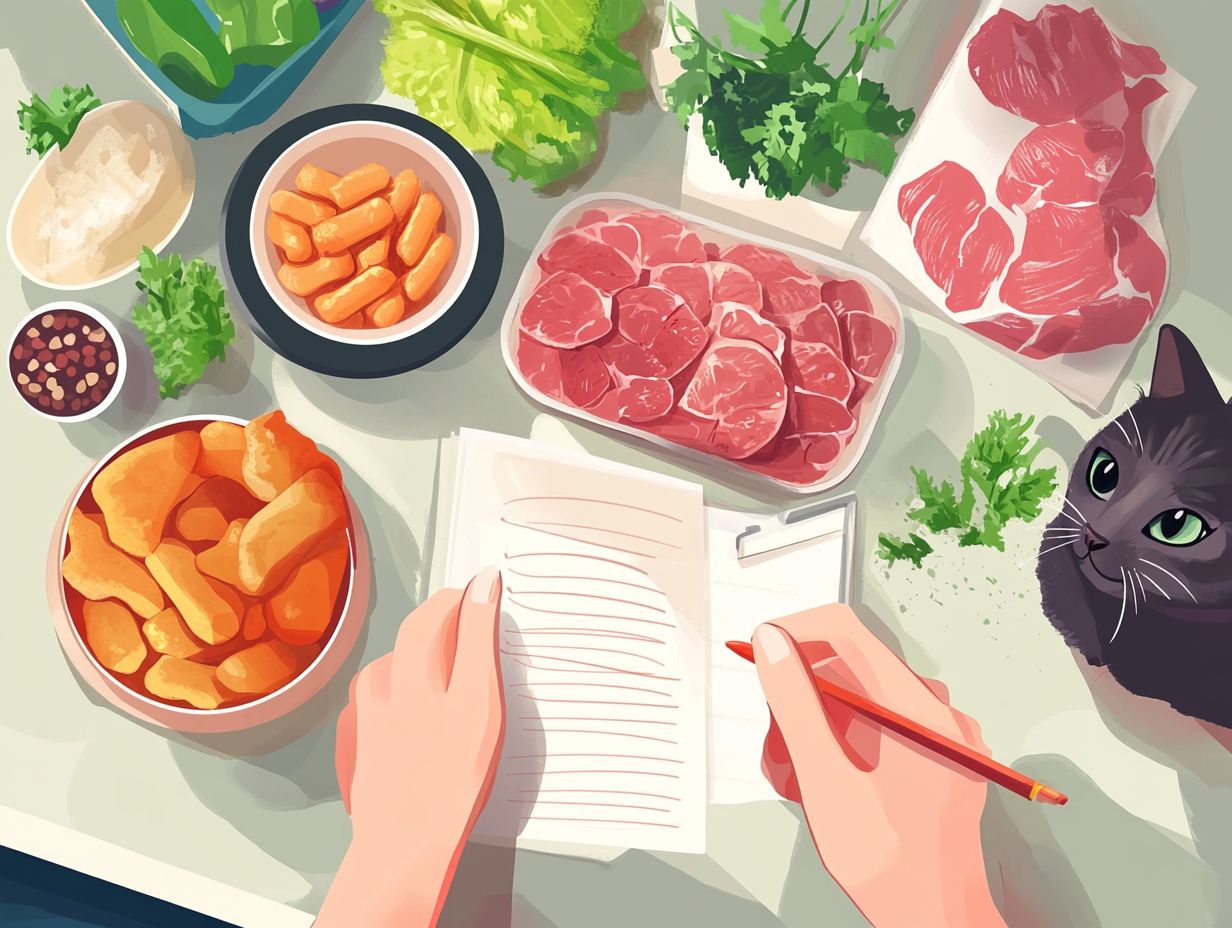
- Avoid foods high in phosphorus, protein, salt, and vitamin D to prevent further strain on the kidneys in cats with CKD. Pay attention to the nutrient composition of cat food.
- Choose low phosphorus (less than 0.5g per 100g) and protein (around 5-8g per 100g) foods with added omega-3 fatty acids, antioxidants, and B vitamins to support kidney function in cats with CKD. Consider including kidney-supportive strains like n-acetyl cysteine and probiotics.
- In addition to dietary changes, consider treatments such as fluid therapy, medications, dietary supplementation, and regular health monitoring to support and manage kidney disease symptoms in cats.
What Foods Should Be Avoided for Cats with Kidney Disease?
Chronic kidney disease (CKD) in cats is managed through careful dietary restrictions, as certain foods can exacerbate symptoms and impair kidney function by affecting nephron function. Foods high in phosphorus should be avoided, as they contribute to elevated phosphorus levels and phosphorus buildup in the bloodstream, worsening the cat’s kidney issues.
Additionally, high-protein foods should not be given, as they place extra strain on the kidneys and may affect protein intake and creatinine clearance. Foods with high salt content can lead to hypertension and fluid retention. Furthermore, preservatives and excessive vitamin D can create imbalances and nutrient content that are harmful to feline health and may lead to nutrient imbalances.
1. High Phosphorus Foods
High phosphorus foods can pose a significant risk to cats with chronic kidney disease (CKD) as they may elevate phosphorus levels in the blood, further compromising kidney function. This includes specific meats such as chicken thighs, beef liver, and various types of salmon, which tend to have higher phosphorus content. Instead, opt for turkey or egg whites as safer alternatives.
Some commercial cat food brands, particularly those that are high in protein or grain-free, may also contain elevated levels of this mineral. Increased phosphorus can lead to complications like calcification of soft tissues and added stress on already weakened kidneys.
Therefore, it is crucial for caregivers to monitor dietary phosphorus intake and opt for low-phosphorus options when available to promote better kidney health and enhance the quality of life for cats suffering from this condition.
2. High Protein Foods
High-protein foods can accelerate the progression of chronic kidney disease (CKD) in cats by increasing the workload on the kidneys, which hastens the decline of kidney function. This issue becomes particularly problematic when the kidneys struggle to filter excess protein waste effectively, leading to the accumulation of toxins in the bloodstream.
Generally, it is recommended that cats affected by CKD maintain a protein level of approximately 5-8 grams per 100 grams of their total daily calories, with the protein being high-quality and easily digestible. Renal diets for these cats typically include proteins derived from easily digestible sources like eggs or chicken breast, which provide essential amino acids without placing excessive strain on the kidneys.
Additionally, there are specially formulated commercial diets designed to control protein, phosphorus, and sodium levels.
3. Foods with Excessive Salt
Foods that are high in salt can lead to hypertension and fluid retention, both of which may exacerbate kidney function in cats with chronic kidney disease (CKD). When cats consume high-sodium diets, their bodies can struggle to regulate blood pressure, placing additional strain on the kidneys. This situation is particularly perilous for those already suffering from CKD, as elevated blood pressure can accelerate the progression of the disease.
Importance of Hydration
Hydration is critical for cats with CKD. Ensure your cat has access to fresh, clean water at all times. Consider providing wet food options, as they contain higher moisture content, which can aid in hydration. Additionally, using a pet water fountain may encourage your cat to drink more.
Risks of Homemade Diets
While homemade diets can be appealing, they may lack essential nutrients. It’s crucial to consult with a veterinarian before switching to a homemade diet to ensure it meets your cat’s dietary needs without causing deficiencies.
Food Storage and Spoilage
Properly storing cat food is vital. For dry food, keep it in a cool, dry place and ensure the bag is tightly sealed. Wet food should be refrigerated once opened and used within a few days. Always check for signs of spoilage, such as an off smell, discoloration, or mold, and discard any food that appears spoiled.
Regular Veterinary Check-Ups
Regular veterinary check-ups are essential in monitoring kidney function and adjusting dietary needs as necessary. Your veterinarian can provide tailored recommendations based on the progression of CKD.
Many commercially available cat foods, particularly certain dry food diets and treats, are known to contain high levels of sodium. For instance, Brand X cat food has 80 mg of sodium per 100 kcal, while Brand Z cat treats contain 70 mg of sodium per 100 kcal. Consider opting for high-quality pet foods and low sodium options instead.
To mitigate the risks associated with high sodium intake, pet owners can opt for lower-sodium alternatives, such as renal diets specifically formulated with controlled protein and phosphorus levels or wet cat food, which provide essential nutrients and aid in hydration. Always consult with a veterinarian before making dietary changes for cats with kidney disease.
4. Foods with Added Preservatives
Foods containing added preservatives can introduce harmful chemicals that negatively impact the overall nutritional balance and kidney health of cats with chronic kidney disease (CKD). Many commercial cat foods use common preservatives like BHA, BHT, and ethoxyquin. While their safety is still debated, it’s essential to check with veterinary professionals regarding their use as they may hinder nutrient absorption and contribute to various health issues over time.
These artificial additives can disrupt the delicate balance of vitamins and minerals essential for a cat’s well-being, particularly for those already suffering from conditions such as CKD. Therefore, it is crucial for pet owners to seek out premium brands or those labeled as preservative-free, as these options generally offer greater nutritional integrity and are gentler on sensitive systems.
Making these dietary choices can significantly aid in maintaining optimal renal health and enhancing the quality of life for our pets.
5. Foods with High Levels of Vitamin D
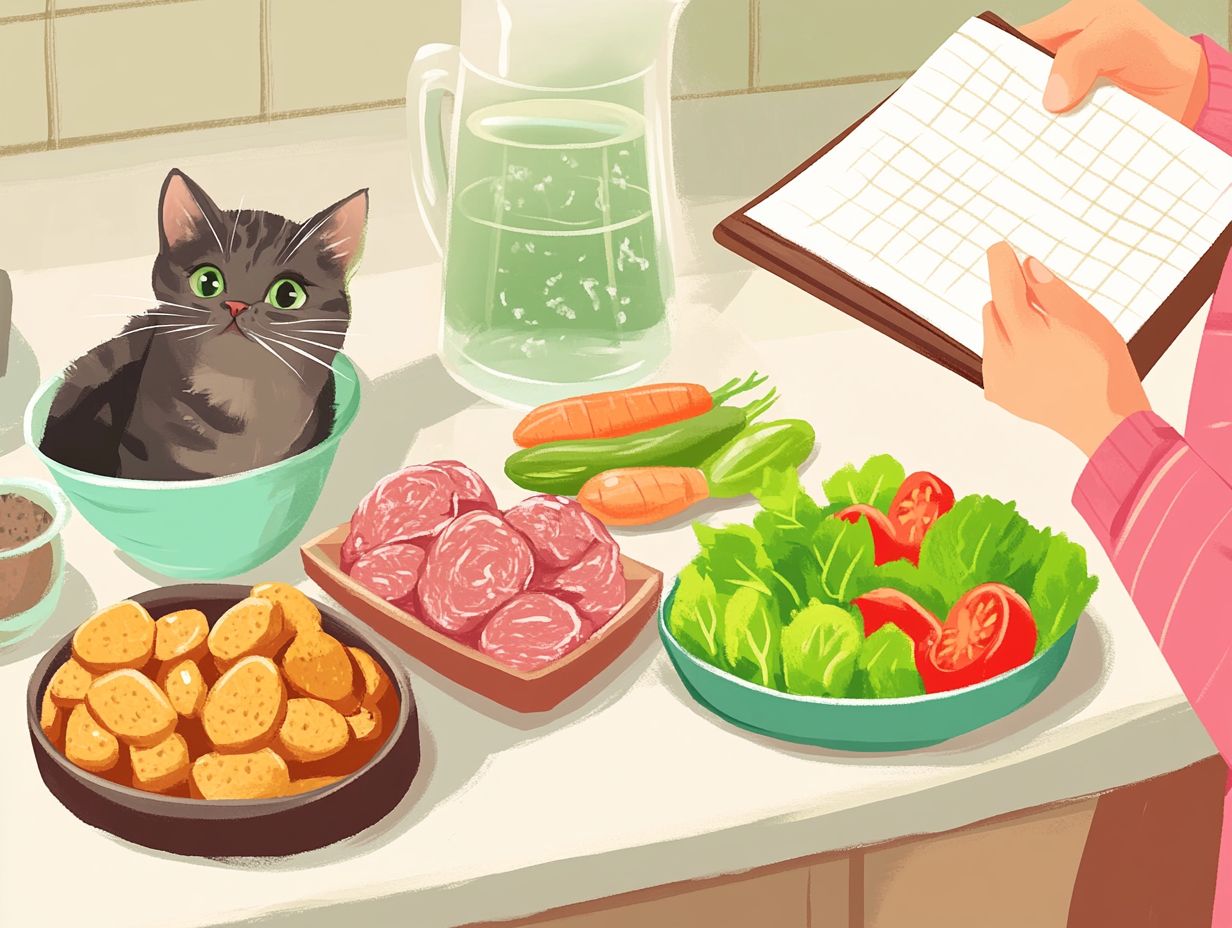
Foods rich in vitamin D can disrupt the delicate balance of calcium and phosphorus in cats, potentially worsening renal function in those with chronic kidney disease (CKD). This is because vitamin D plays a crucial role in regulating the absorption of calcium and phosphorus in the intestines, which affects their overall blood levels and bone health.
While adequate levels of vitamin D are necessary for healthy metabolic functions, excessive amounts can lead to hypercalcemia, resulting in kidney and cardiovascular damage. Caregivers should exercise caution when selecting cat food, ensuring it provides the minimum necessary Recommended Dietary Allowances (RDAs) of 200-400 IU/kg without exceeding the maximum limits.
Choosing foods low in vitamin D, such as certain fish or meat-based diets, is advisable. A high-quality, well-balanced diet that emphasizes the proper ratios of nutrients is essential to meet the cat’s nutritional needs while minimizing the risk of toxicity.
What Foods Are Safe for Cats with Kidney Disease?
Selecting appropriate foods for cats with chronic kidney disease (CKD) is essential for promoting their overall health and well-being while managing the condition. This involves choosing low-phosphorus and low-protein options that still provide all the necessary nutrients without placing excessive strain on their already compromised kidneys. Consider renal support products like Royal Canin Renal Support or Darwins Intelligent Design for optimal renal health.
1. Low Phosphorus Foods
Low phosphorus foods are essential components of a renal diet for cats with chronic kidney disease (CKD). These foods help maintain balanced phosphorus levels, reducing stress on the kidneys and allowing them to function more effectively. Monitoring potassium levels and ensuring adequate hydration are also crucial for CKD management.
Some specific examples of low phosphorus foods include:
- Lean Meats: Chicken, turkey, and rabbit are lean protein sources that contain lower phosphorus levels compared to other meats like beef or pork. These meats offer high-quality protein without excessive phosphorus.
- Vegetables: Green beans and carrots are common vegetables that are low in phosphorus. Besides their low phosphorus content, these vegetables are rich in beneficial vitamins and minerals.
- Renal Diets: Several specially formulated renal diets are available for cats, featuring controlled levels of phosphorus along with other supportive nutrients.
2. Low Protein Foods
Low-protein foods are an essential part of dietary management for cats with chronic kidney disease (CKD) because they reduce the workload on the kidneys while still providing high-quality protein sources when necessary.
Common symptoms of CKD to watch for include increased thirst, frequent urination, weight loss, and lethargy. Identifying these symptoms early can help in seeking timely veterinary care.
It is vital to ensure consistent hydration for cats suffering from CKD. Providing fresh water at all times and incorporating wet food can aid in maintaining hydration.
When storing and handling cat food, it’s important to keep it in a cool, dry place and check for spoilage regularly. Signs of spoilage can include changes in color, odor, or texture. Maintaining food freshness is crucial for nutritional integrity.
While homemade diets can be a viable option, they come with ethical implications and the necessity of consulting a veterinarian to ensure all nutritional needs are met.
Lastly, consider the unique nutritional needs of kittens and senior cats. Kittens require higher levels of protein and fat for growth, while senior cats may need diets lower in calories but rich in easily digestible nutrients.
These diets are important for preserving kidney function in cats with CKD, as well as for improving their nutritional status (the overall condition of a cat’s nutrition, encompassing both the quality and quantity of food consumed), overall health (the general physical and mental wellbeing of the cat), and quality of life. Safe low-protein options, such as specially formulated low-protein wet food, egg whites (which should be given in moderation to prevent potential biotin deficiency if fed excessively), and specific vegetables like carrots and green beans can supply essential nutrients without placing excessive strain on the kidneys. Consulting experts like Dr. Lisa Pierson or Ellen Kienzle from Ludwig-Maximillian University can provide additional insight into feline CKD management. Remember to consult a veterinarian before making any dietary changes to ensure safety and appropriateness for your cat.
It is crucial that these diets are carefully formulated to ensure that cats receive adequate nutrition without excessive protein levels. Consulting with a veterinary nutrition expert or veterinarian can help in selecting the appropriate mix of foods and supplements, ensuring a balanced intake that supports vital health while remaining low in protein. This also aids in managing muscle mass and chronic dehydration.
3. Foods with Added Omega-3 Fatty Acids
Foods fortified with omega-3 fatty acids (recommended sources include fish oil and flaxseed oil) can offer significant health benefits for cats with chronic kidney disease (CKD), supporting kidney function and promoting overall feline health. These essential fatty acids play a crucial role in reducing inflammation, which is particularly beneficial for alleviating the strain on compromised kidneys. It is important to follow veterinary guidance regarding dosages to avoid risks of over-supplementation.
By incorporating fish oil or flaxseed oil into their diet, caregivers can help manage symptoms associated with CKD. Additionally, fatty fish such as salmon, mackerel, and sardines are rich sources of omega-3s and can be included in meals occasionally. Always consult a veterinarian for advice on the proper amounts and to monitor any potential adverse effects.
For a renal diet, these foods can be easily mixed into specialized cat food, providing both nutritional support and appealing flavors that encourage feeding, aligning with veterinary guidelines for optimal feline nutrition. Regular consultation with a veterinarian can further tailor the diet to ensure optimal kidney health.
4. Foods with Added Antioxidants
Foods rich in antioxidants can help prevent oxidative damage, which is crucial for managing chronic kidney disease (CKD) and promoting overall kidney health. Antioxidants play a significant role by neutralizing free radicals that cause oxidative damage, potentially slowing the progression of CKD. However, they cannot replace a balanced diet tailored to CKD.
Common types of antioxidants include vitamins E and C, along with flavonoids and polyphenols. Incorporating high-antioxidant foods such as blueberries, cranberries, and spinach into a cat’s diet can aid in CKD prevention, but be cautious as some cats may experience gastrointestinal issues with these foods.
Additionally, certain fish oils that are high in omega-3 fatty acids can enhance the diet’s antioxidant status while also improving palatability, making it suitable for cats with CKD.
5. Foods with Added B Vitamins
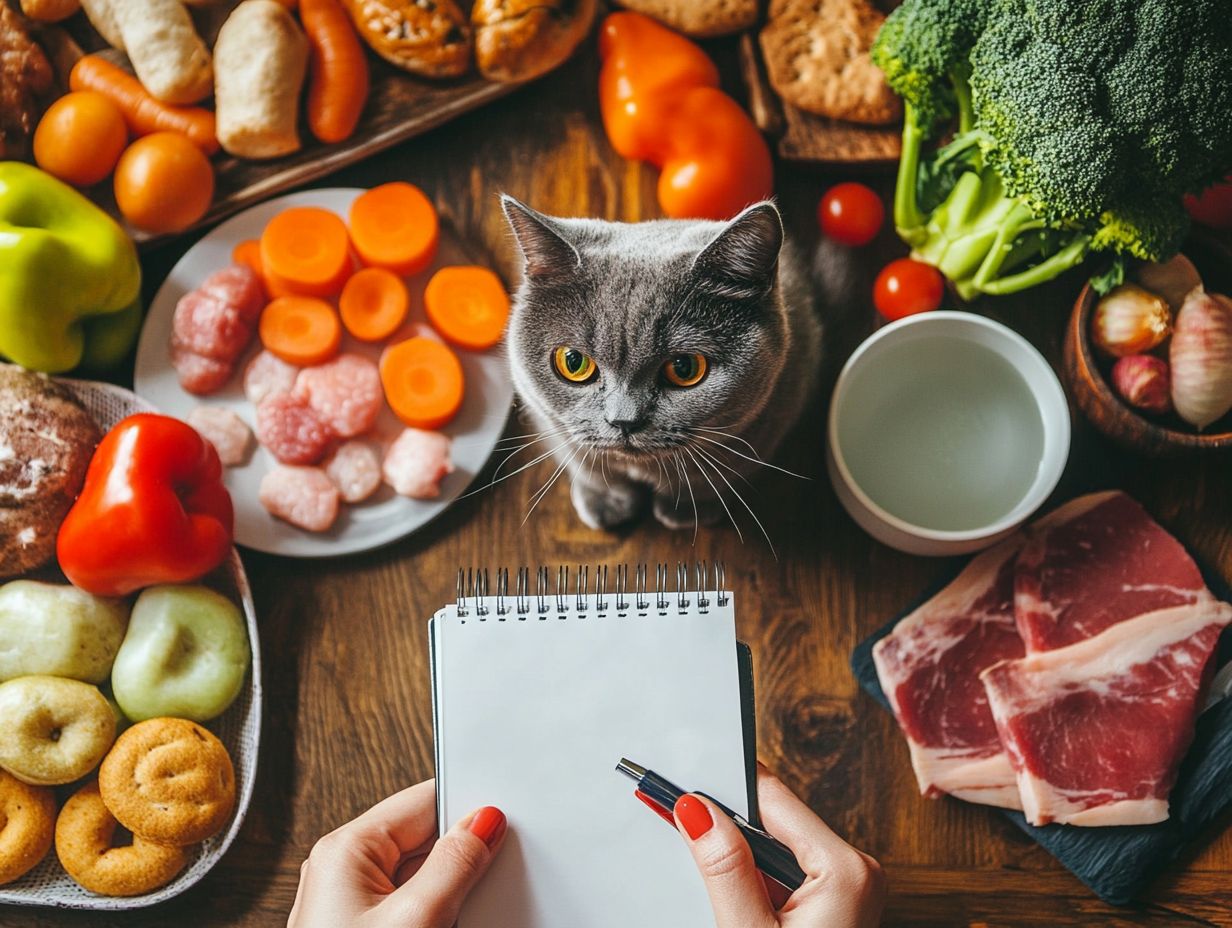
Foods enriched with B vitamins are beneficial for cats with chronic kidney disease (CKD), as these vitamins help maintain overall health and support the kidneys’ filtration processes, enhancing nephron function. B vitamins are essential for energy metabolism, which converts food into usable energy for the daily activities and bodily functions of cats. However, these vitamins should not be viewed as replacements for a complete diet designed for CKD.
Specifically, vitamins B6, B12, and niacin (Vitamin B3) play important roles in maintaining nerve health and increasing red blood cell production, both of which are crucial for managing CKD and maintaining muscle mass.
Foods rich in B vitamins, such as cooked chicken, fish, and certain grains, can be incorporated into their renal diet. Additionally, some vegetables, like spinach and broccoli, contain moderate amounts of B vitamins and can be included as part of a balanced renal diet. However, always be cautious with human foods, as they may pose risks even if they contain beneficial nutrients.
What Other Treatments Can Help Cats with Kidney Disease?
Dietary management is a crucial aspect of caring for cats with chronic kidney disease (CKD), but it is just one component of their overall treatment. Fluid therapy, medications, and dietary supplements also play significant roles in supporting kidney function and enhancing the quality of life for these animals by addressing dietary supplementation needs. Regular veterinary check-ups are important to monitor kidney function, especially when dietary changes are made.
1. Fluid Therapy
Fluid therapy is a crucial component of managing chronic kidney disease in cats, as it addresses chronic dehydration and helps restore kidney function through effective hydration strategies.
There are several types of fluid therapy available, including subcutaneous fluids, intravenous fluids, and oral rehydration solutions, each offering distinct benefits tailored to the severity of the illness.
Subcutaneous fluids are typically administered at home by pet owners, allowing for convenient management of the cat’s hydration levels. In contrast, intravenous fluids are provided exclusively at veterinary clinics and enable rapid rehydration during more acute episodes.
These therapies play a vital role in diluting toxins in the bloodstream and facilitating their excretion. Therefore, it is essential to consult with a veterinarian to determine the specific needs of each cat, ensuring the appropriate type and amount of fluids are used to enhance hydration and improve quality of life.
2. Medications
Medications play a crucial role in managing chronic kidney disease (CKD) in cats, helping to alleviate symptoms and support kidney function through various mechanisms. Appetite stimulants are among the most commonly prescribed medications, as they encourage cats to eat when they are experiencing weight loss due to CKD and nutrient imbalances. By improving nutritional intake, these stimulants can significantly enhance a cat’s quality of life.
Phosphate binders are routinely used to regulate phosphate levels in the bloodstream, since elevated phosphate can have harmful effects on renal health. The effectiveness of these treatments varies based on the individual cat and the specific stage of the disease. This underscores the importance of regular veterinary care, as the appropriate medication and dosage will differ according to each cat’s unique needs.
Warning: Consult your veterinarian before making any dietary changes, especially regarding high-protein or high-phosphorus diets, which can worsen kidney function.
3. Dietary Supplements
Dietary supplements, including those specifically designed to support kidney health, can enhance the nutritional management of cats with chronic kidney disease (CKD) and contribute to their overall well-being. These supplements address the unique needs of cats facing this condition, as they often require specialized nutrients to support renal function. It’s important to note that, as obligate carnivores, cats require animal-source proteins in their diets.
For example, probiotics can improve gut health and enhance nutrient absorption, which is essential for maintaining energy levels. N-acetyl cysteine acts as an antioxidant and may help reduce oxidative stress on the kidneys. Additionally, specific nutrients like omega-3 fatty acids can help lower inflammation and support cardiovascular health.
Before incorporating these supplements into a cat’s diet, it is advisable to consult with a veterinarian, who can provide tailored advice on dosing and the best methods for integrating them into regular meals. Health and safety concerns, including potential allergens and toxic ingredients, should also be addressed.
4. Subcutaneous Fluid Injections
Subcutaneous fluid injections are an effective method for delivering hydration and electrolytes to cats with chronic kidney disease (CKD), especially those experiencing chronic dehydration. This technique involves administering a sterile solution under the skin, allowing for gradual absorption into the bloodstream to replenish lost fluids.
Veterinary professionals often recommend these injections to help manage CKD symptoms, particularly when a cat cannot drink sufficient amounts of water. Proper hydration supports kidney function, enhances overall well-being, and can significantly improve the quality of life for affected felines.
It is essential to consult with a veterinarian for guidance on dosage and administration, as incorrect practices can lead to complications.
5. Regular Monitoring and Check-ups
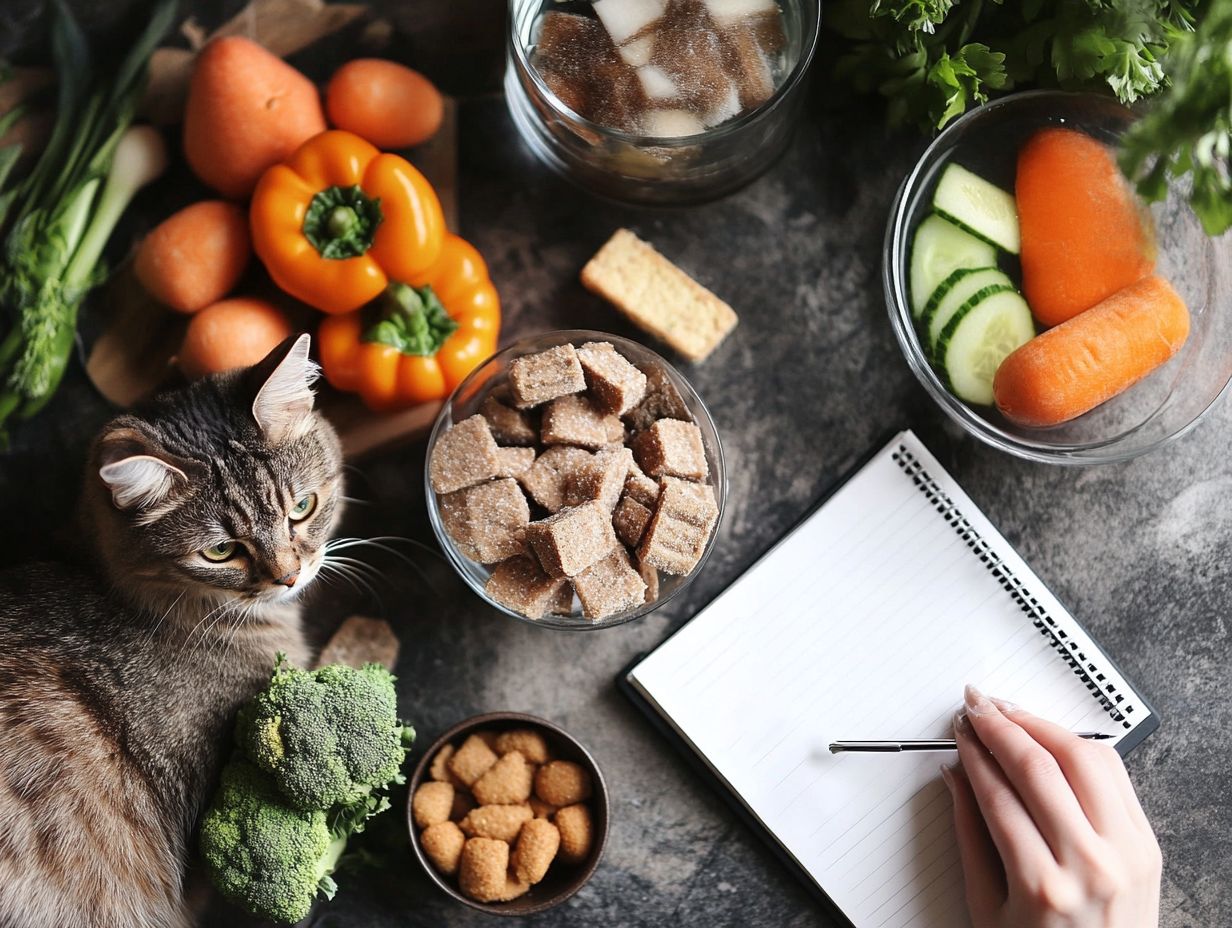
Regular monitoring and check-ups are essential components of chronic kidney disease (CKD) management in cats, as they facilitate the early detection of complications and allow for adjustments to treatment plans when necessary.
These visits provide veterinarians with the opportunity to conduct blood tests to evaluate kidney function and electrolyte levels, as well as urinalysis to assess hydration status and identify any protein loss.
By regularly checking markers such as creatinine and blood urea nitrogen, the healthcare team can evaluate the progression of CKD. This information enables pet owners to determine the appropriate timing for implementing dietary changes, medications, and other supportive measures for their cats with CKD.
Monitoring Recommendations: Consult your veterinarian regarding the frequency of tests and specific markers to monitor, as they relate to dietary and treatment adjustments.
Frequently Asked Questions
What are some foods I should avoid feeding my cat with kidney disease?
Some foods you should avoid feeding your cat with kidney disease include high phosphorus foods, high protein foods, and foods high in sodium. These foods can worsen your cat’s condition and put additional strain on their kidneys by affecting phosphorus levels. Consider consulting your veterinarian for personalized dietary recommendations.
Can I give my cat treats if they have kidney disease?
While it’s generally advised to limit treats for cats with kidney disease, consult your veterinarian for specific kidney-friendly treats that are safe and appropriate for your cat’s condition.
Is it safe to feed my cat a homemade diet if they have kidney disease?
While it is typically not recommended to feed your cat a homemade diet due to potential nutrient deficiencies, seek advice from your veterinarian. They can provide guidance for formulating a balanced homemade diet that meets your cat’s specific health needs.
Should I avoid giving my cat any over-the-counter medications?
Yes, avoid giving your cat any over-the-counter medications or supplements without first consulting your veterinarian, as certain ingredients can be harmful to their kidneys or may interact with their current medications.
Can I still give my cat wet food if they have kidney disease?
Yes, wet food can be beneficial for cats with kidney disease, but it’s crucial to select a product specifically formulated for renal health that is low in phosphorus and protein. Consult your veterinarian for brand recommendations that align with your cat’s dietary needs.
Is it okay to feed my cat a raw diet if they have kidney disease?
No, feeding a raw diet is generally not recommended for cats with kidney disease due to potentially high levels of protein and phosphorus that can exacerbate their condition. Always discuss dietary options with your veterinarian to ensure a balanced, safe diet that supports their health.
